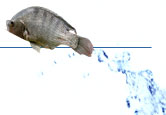|
Fish farming The Fazendas Reunidas Vale do Juliana is a business committed to both high productivity and environmental protection and social justice. Fish farming represents one of its greatest projects, with production capacity of up to 12 million hatchings per year, as well as 1,650 tons tilapias per year produced from its installed water potential. This totals 25 aquaculture units with the capacity of developing technology for the creation of fish with exporting quality. Get to know a little more about how fish farming reflects another example of the high reputation of the products that carry the quality brand of Fazendas Reunidas Vale do Juliana. Net ponds: a reasonable alternative Fish farming in net ponds is a technological alternative to intensive breeding that uses the resources of lakes, ponds, streams, rivers and dams. The net ponds are structures built with screens or nets enclosed from all sides that, similar to a tank, circulate water. One of the greatest advantages of the net pond is the continuous water circulation, which allows waste to be removed by constantly cycling in oxygen. The environment is structured as a type of box, which is made from a screen being placed on top of a water surface. From there, animals develop in separate compartments beginning with their hatching phase to the final fishing stage. This breeding system has been expanding all over Brazil, gaining popularity among different rural producers in different regions of the country. Here are a few of the many advantages that this farming technique provides: It is worth mentioning that these specific qualities make tilapias one of the fish with the greatest potential for fish farming: 1. They feed on basic items in the food chain |
|


Rodovia Juliana S/N, Km Final . Zona Rural . Igrapiúna / BA CEP: 45.443-000 . Tel: (73) 3256 8800 \\ contato@valedojuliana.com.br